Best Ethereum Wallets: Browser, Mobile & Hardware (2025)

Summary: Ethereum wallets are the tools that connect users to crypto: they store private keys, manage ETH and ERC-20 tokens, and let you interact with smart contracts and decentralized apps.
We evaluated wallets based on security, user experience, and cross-platform compatibility. Below is our shortlist of the top 7 ETH wallets that meet those standards.
- MetaMask - Best Ethereum Wallet Overall
- Coinbase Wallet (Base App) - All-in-One Web3 Hub
- MyEtherWallet - Original Open-Source ETH Wallet
- Ledger Nano S Plus - Hardware Security for ERC-20 Assets
- Exodus - Great for Staking ETH and Other Cryptocurrency
- Trezor Model T - Touchscreen Security for Tokens and NFTs
- Trust Wallet - Top Mobile Ethereum dApp Access
MetaMask is the best Ethereum wallet, trusted by over 100 million users for managing ETH, ERC-20 tokens, and securely accessing decentralized protocols, DEXs, and crypto bridges.
Supported Blockchains
All EVM Chains plus some non-EVM chains with MetaMask Snaps
Security Properties
Non-Custodial, Hardware Integration & Ledger Support
Wallet Audits
Several audits conducted by ConsenSys
Best Ethereum Wallets in 2025
MetaMask remains the obvious top choice for most Ethereum users in 2025, thanks to its widespread adoption and rich feature set. However, privacy concerns, interface preferences, and specific use cases like staking or hardware integration mean users increasingly look for alternatives.
To help identify the best Ethereum wallets today, the Datawallet team conducted full hands-on testing and reviewed user feedback from the Ethereum community. We considered factors like ease-of-use, multi-chain compatibility, security incidents, and support DeFi, Layers 2s, and other onchain activities.
The comparison table below breaks down each wallet's supported blockchains, hardware compatibility, notable privacy features, recent security record, and ease of ERC-20 token management:
1. MetaMask
MetaMask is the industry-standard Ethereum wallet, launched in 2016 by Consensys Software as a browser extension and now used by roughly 30 million people each month. With over 100 million total users since its inception, it remains a primary choice for Ethereum and Web3 interactions.
The wallet offers built-in token swapping, Web3 dApp browsing, and Blockaid security alerts for networks like Ethereum, Arbitrum, Avalanche, and Linea. It supports more than 50 additional blockchains via MetaMask Snaps, added native Solana support in May 2025, and plans full Bitcoin integration by late 2025.
Over the years, our experience shows that MetaMask consistently meets the practical needs of Ethereum users, though community feedback often highlights concerns about privacy with the default RPC provider, Infura. Users who prefer stronger privacy protections typically configure alternative RPC endpoints.
MetaMask Highlights:
- Type of Wallet: Non-custodial software wallet available on browsers and mobile devices.
- Privacy Features: No KYC required; private keys stored locally; customizable RPC endpoints.
- Multi-Chain Support: Ethereum, Solana, and 50+ blockchains supported through Snaps plugins.
- Price: Free.

2. Coinbase Wallet (Base App)
The Base App, rebranded from Coinbase Wallet in July 2025, is a Web3 platform combining finance, messaging, social features, mini-apps, and DeFi services. Developed by Coinbase Global, it expands the wallet into a blockchain “super-app” for a unified user experience.
It is a non-custodial smart wallet supporting Bitcoin, Ethereum, Solana, Avalanche, Polygon, BNB Chain, and other Ethereum-compatible networks. Key features include built-in DEX swaps, cb.id usernames (in collab with ENS), USDC payments, staking, NFTs, encrypted messaging (XMTP), and a dApps browser.
From ongoing use and community feedback, the Base App is reliable across multiple chains. Privacy-conscious users note it is distinct from the Coinbase exchange, which requires identity verification. Local key and passkey management further reinforce user trust.
Base App Highlights:
- Type of Wallet: Non-custodial smart wallet with local or passkey key management.
- Privacy Features: No KYC required; encrypted messaging and anti-phishing protections.
- Multi-Chain Support: Bitcoin, Solana, Avalanche, XRP, DOGE, & Ethereum-compatible blockchains.
- Price: Free.
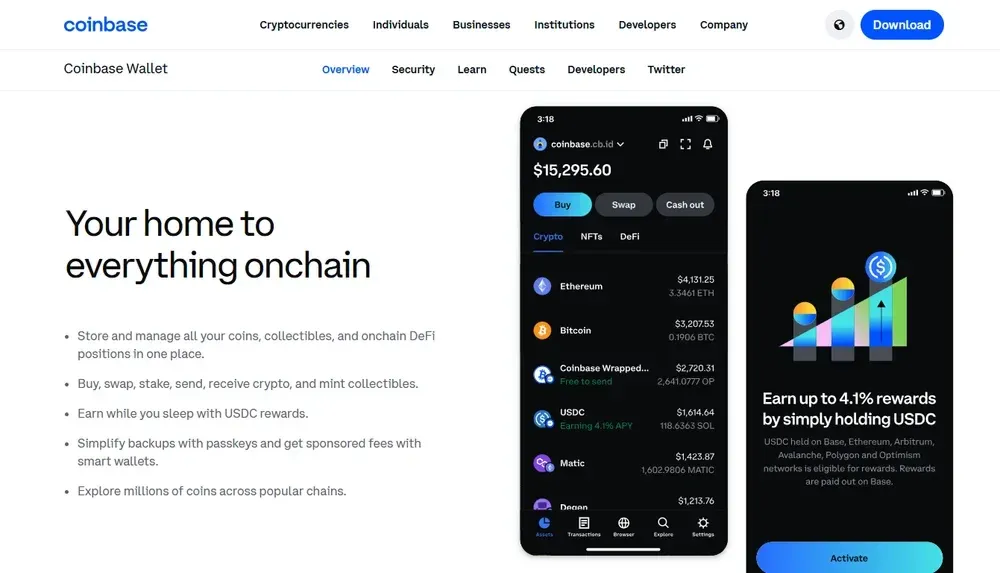
3. MyEtherWallet
Ranking third in our list is MyEtherWallet (MEW), a non-custodial Ethereum wallet launched in 2015 as one of the first client-side Ethereum web wallets. Developed by the MyEtherWallet team under CEO Kosala Hemachandra, MEW remains an open-source wallet interface.
MEW currently serves about 3 million active users, along with an additional 200,000 who use its multi-chain browser extension, Enkrypt, introduced in 2022. The wallet is accessible via web browsers and mobile apps (iOS and Android), and supports integration with hardware wallets like Ledger and Trezor.
Long-time users consistently value MEW's emphasis on privacy, including local storage and encryption of private keys, providing users full control over their funds. Community feedback also highlights recent privacy enhancements, such as the integration of garbled-circuits technology through Enkrypt.
MyEtherWallet Highlights:
- Type of Wallet: Non-custodial client-side wallet, available via web, mobile, and browser extension.
- Privacy Features: No user data collected; private keys securely stored locally.
- Multi-Chain Support: Ethereum Classic, BNB Chain and cross-chain swaps through DEX aggregators.
- Price: Free.
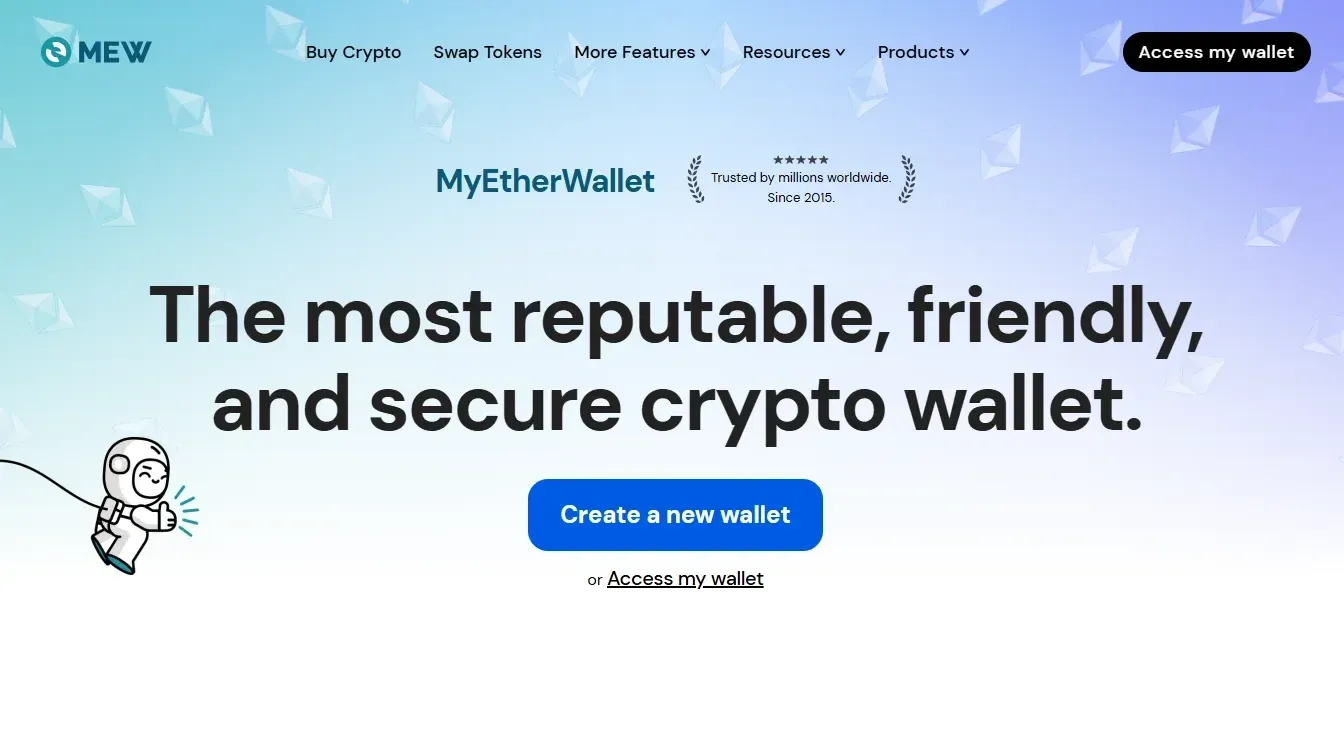
4. Ledger Nano S Plus
The Ledger Nano S Plus is a hardware cryptocurrency wallet released by Ledger SAS, a French company specializing in crypto wallets since 2014. Introduced in June 2022 as the successor to the original Nano S, this wallet securely stores private keys offline in a dedicated chip.
The device connects via USB-C to desktop computers or Android devices and includes a CC EAL5+ certified Secure Element chip for key storage. It supports over 5,500 cryptocurrencies, including Bitcoin, Ethereum, XRP, Solana, NFTs, and thousands of ERC-20 and BEP-20 tokens, all accessed through Ledger Live.
During extended usage, the Nano S Plus handled daily crypto transactions smoothly, displaying clear confirmations on its built-in screen before approving transfers. The optional passphrase feature provided an extra layer of privacy, allowing users to create hidden wallets while easily verifying genuine firmware.
Ledger Nano S Plus Highlights:
- Type of Wallet: Non-custodial hardware (cold) wallet, USB-C connectivity, no Bluetooth or battery.
- Security Features: CC EAL5+ Secure Element chip, PIN protection, anti-tampering OS (BOLOS).
- Multi-Chain Support: 5,500+ cryptocurrencies, stablecoins, NFTs, and ERC-20/BEP-20 tokens.
- Price: Approximately USD 79 as of 2025.
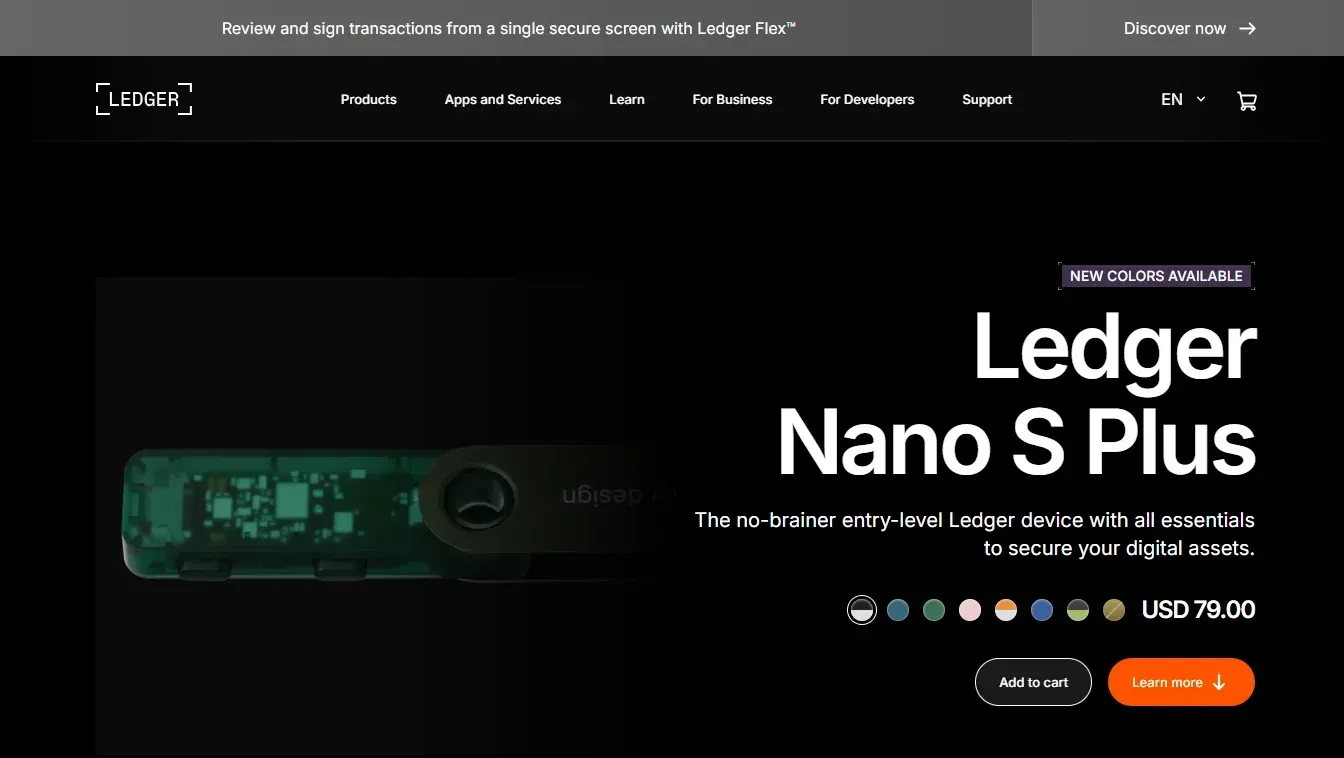
5. Exodus
Exodus, launched in 2015 by Exodus Movement, Inc., is a non-custodial cryptocurrency wallet designed for secure self-management of digital assets. Recognized as one of the most widely used Ethereum wallets, Exodus supports over 100,000 cryptocurrencies across desktop, mobile, and browser platforms.
The wallet allows users to fully control private keys stored locally and encrypted on their personal devices, eliminating the need for accounts or identity verification. Exodus employs rigorous security processes like manual audits and bug bounties, supports biometric and PIN protection on mobile.
Long-term users particularly appreciate Exodus for its vast staking support on networks such as Cardano, Solana, and Ethereum. Recent community feedback highlights enthusiasm for the newly introduced Passkeys Wallet SDK, enabling frictionless, seed-phrase-free wallet integration into decentralized apps.
Exodus Highlights:
- Type of Wallet: Non-custodial software wallet for desktop, mobile, and browser.
- Security Features: Locally encrypted private keys, biometric/PIN protection, rigorous software audits.
- Multi-Chain Support: Over 100,000 digital assets (ADA, SOL, ETH, ATOM, etc).
- Price: Free.
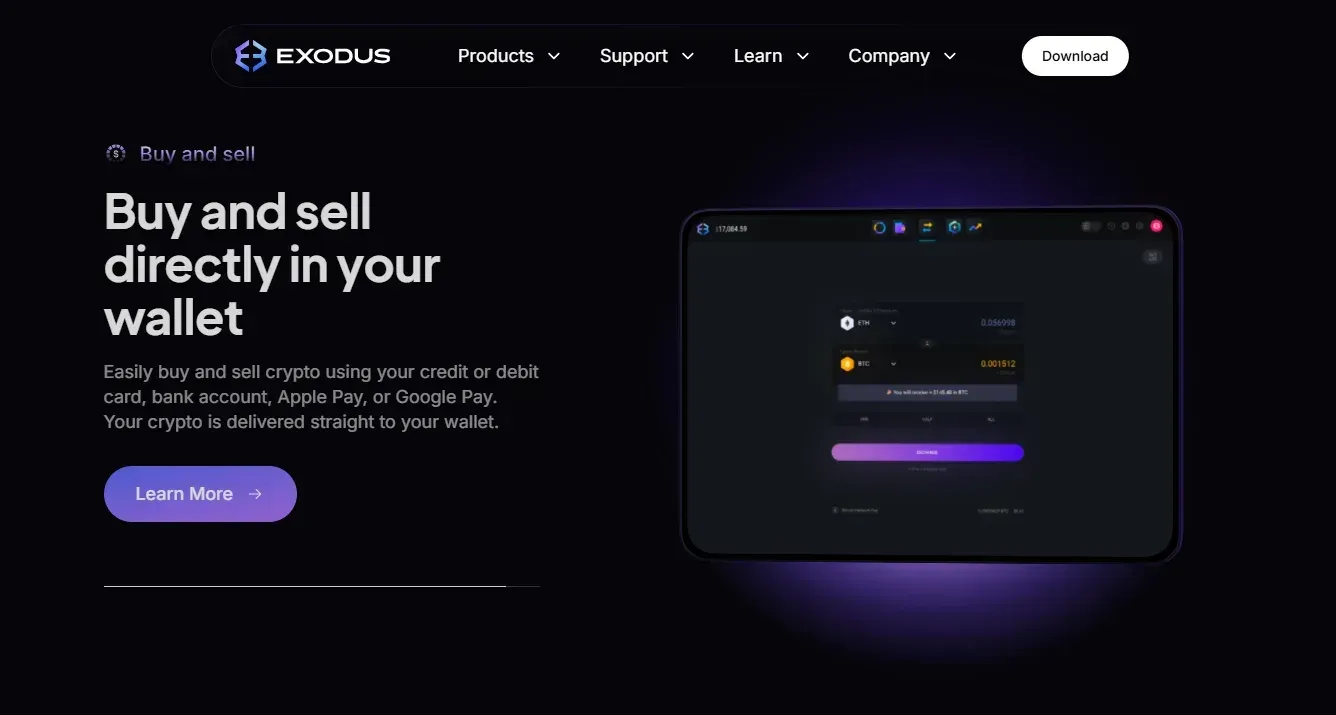
6. Trezor Model T
The Trezor Model T, introduced in 2018 by Czech-based manufacturer SatoshiLabs, is a premium hardware cryptocurrency wallet featuring secure offline storage. Developed as a non-custodial device, it keeps private keys completely offline within the wallet’s internal memory, ideal for native Ethereum users.
Key features include a 1.54-inch color LCD touchscreen, USB-C connectivity, and strong security protocols like PIN protection, optional passphrase security, and Shamir Backup for multi-share recovery. It supports between 1,800 and 8,500 cryptocurrencies, and all ERC-20 tokens via integrations like Trezor Suite and MetaMask.
Many users, ourselves included, find the touchscreen interface intuitive for securely verifying full transaction details directly on the device. Based on community feedback, the open-source firmware and transparent security design have earned strong trust among crypto investors managing diverse portfolios.
Trezor Model T Highlights:
- Type of Wallet: Non-custodial hardware wallet (cold storage).
- Security Features: PIN security, open-source firmware, BIP39 passphrase, Shamir Backup.
- Multi-Chain Support: Over 1,800 assets including Bitcoin, Ethereum, Cardano.
- Price: Approximately USD 129 on official Trezor website as of 2025.
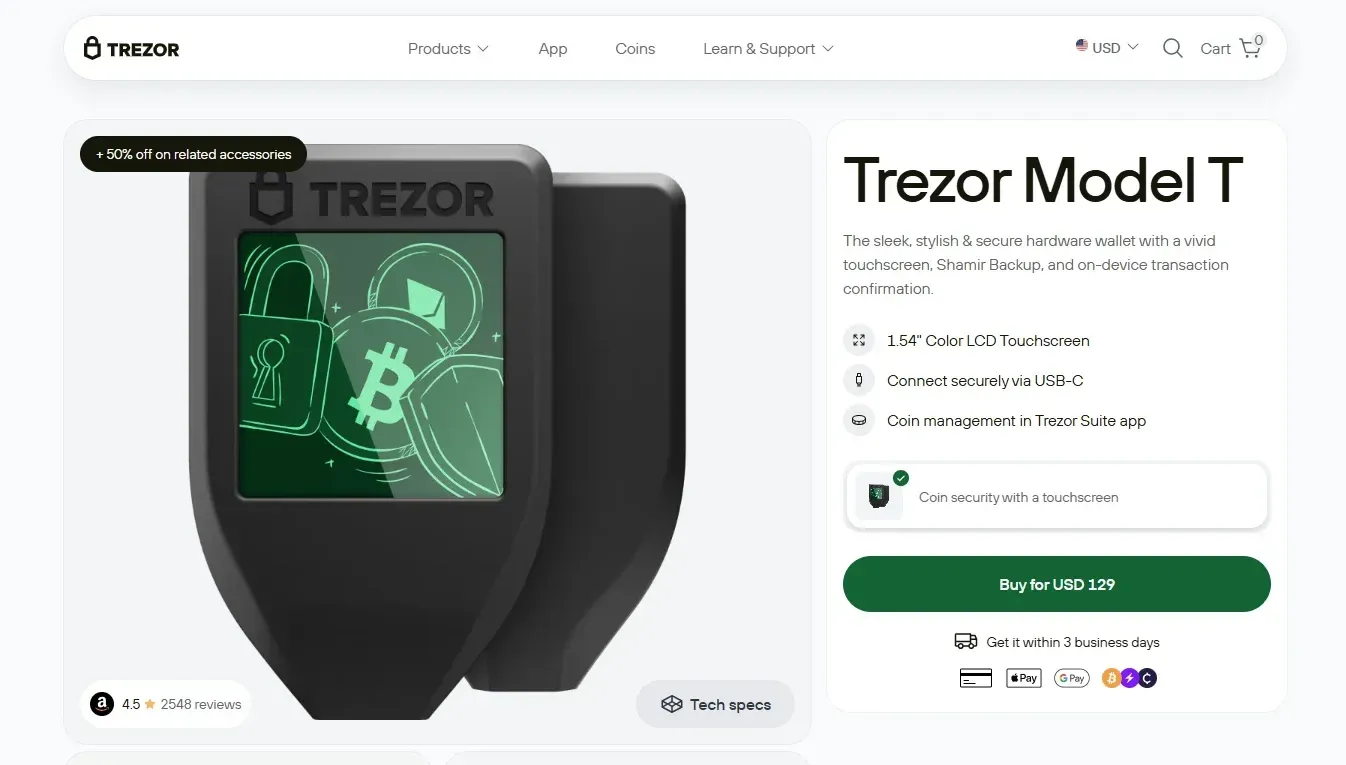
7. Trust Wallet
Trust Wallet, the final Ethereum wallet on our list, is a non-custodial wallet founded in 2017 and later acquired by Binance. Now trusted by over 200 million users worldwide, it securely manages Ethereum-based tokens, NFTs, and stablecoins across multiple blockchains.
The wallet stores private keys locally, offering encrypted backups, biometric login, and a built-in Security Scanner that identifies risky transactions or malicious dApps. Trust Wallet collects no user data, IP addresses, or balances, ensuring complete privacy when accessing Ethereum's ecosystem.
From personal experience, managing Ethereum assets like NFTs and ERC-20 tokens through Trust Wallet is straightforward, especially when swapping tokens directly in-app. Users frequently highlight how easily they can interact with Ethereum dApps and staking pools directly through its mobile interface.
Trust Wallet Highlights:
- Type of Wallet: Non-custodial software wallet available on mobile and browser, storing keys locally.
- Security Features: Local key storage, biometric protection, zero personal data tracking.
- Multi-Chain Support: Ethereum, and over 10 million assets across 100+ blockchains.
- Price: Free.

What is an Ethereum Wallet?
An Ethereum wallet is software or hardware that securely manages Ether (ETH), ERC-20 tokens, and other Ethereum-based digital assets. It stores private keys, unique cryptographic codes that authorize blockchain transactions, ensuring only the wallet owner can access funds.
ETH wallets also serve as gateways for users to interact directly with decentralized applications, commonly known as dApps. To perform transactions or use decentralized exchanges, users pay gas fees, small costs required to compensate validators who process blockchain transactions.
Wallets may be browser extensions, mobile apps, or physical hardware devices designed for enhanced security through offline private key storage. Regardless of wallet type, they enable secure, user-friendly management of digital assets, dApps interactions, token transfers, and payment of gas fees.
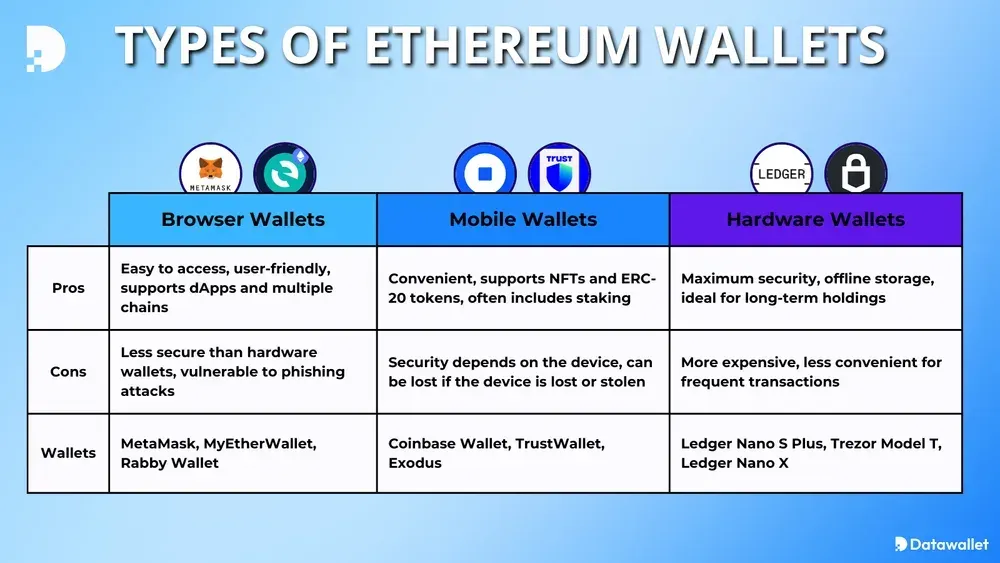
How to Set Up Your ERC-20 Wallet
Setting up an ERC-20 wallet means installing a secure app like MetaMask and safely managing your private keys. This process ensures your tokens remain secure and easily accessible.
Follow these easy steps to get started:
- Download MetaMask: Visit the official MetaMask website and install the wallet browser extension or mobile app directly from there to avoid scams.
- Create Your Wallet: Open MetaMask, select "Create a Wallet," and choose a strong, unique password to protect your funds.
- Record Recovery Phrase: Carefully write down the provided 12-word Secret Recovery Phrase and store it securely offline, like on paper or a metal backup.
- Verify Phrase: Confirm your Secret Recovery Phrase by entering the words in the correct order as prompted, ensuring you've noted them correctly.
- Deposit Ethereum: Send Ethereum (ETH) to your MetaMask wallet address to cover gas fees required for transactions involving tokens like USDT or UNI.
- Add ERC-20 Tokens: Use the "Import Tokens" feature to add specific ERC-20 tokens, like USDT, UNI, or LINK, by searching their names or pasting token contract addresses found on platforms like CoinGecko.
For additional security, you can connect your MetaMask wallet to hardware wallets such as Ledger or Trezor, which store your private keys offline. Additionally, you can customize your wallet’s RPC endpoints through reputable sources like ChainList for quicker transaction processing or better privacy.
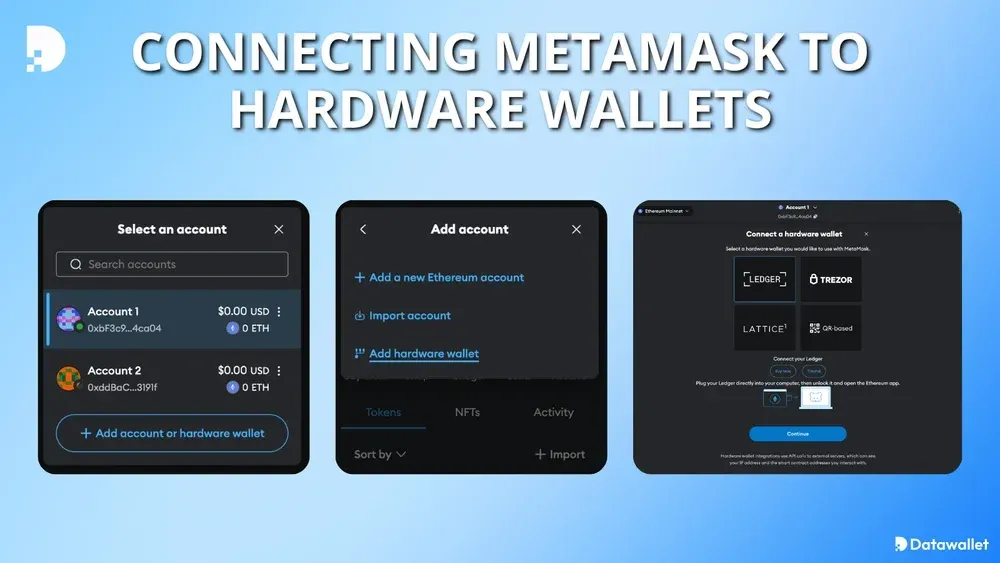
How To Choose The Best ETH Wallet
Choosing the best ETH wallet involves balancing strong security, ease of use, and compatibility with tokens and DeFi protocols. Consider these factors when selecting your wallet:
- Prioritize Security: Choose hardware wallets like Ledger or Trezor to securely store larger amounts of Ethereum and ERC-20 tokens offline.
- Ensure Token Compatibility: Confirm your wallet supports popular tokens such as USDT or UNI, as well as NFTs, for smoother transactions.
- Evaluate User-Friendliness: Opt for intuitive wallets like MetaMask or Trust Wallet that simplify everyday crypto management and interactions with dApps.
- Check dApp Integration: Ensure your chosen wallet seamlessly connects with commonly used dApps like Uniswap, Aave, or OpenSea.
- Review Privacy Features: Pick wallets like MyEtherWallet or Exodus that don’t require large personal data or identity verification for usage.
- Assess Multi-chain Support: If you regularly use other blockchains besides Ethereum, choose wallets that offer built-in multi-chain management capabilities.
As mentioned in our guide on Solana wallets, adopting a three-wallet approach can greatly improve security and convenience. Use a hardware wallet for long-term holdings, a mobile wallet for trusted dApps, and maintain a burner MetaMask wallet for riskier plays like flipping meme coins.
Best Multisig Wallet for Ethereum
Safe (formerly Gnosis Safe) is Ethereum’s leading multisig wallet with customizable signer thresholds, such as 2-of-3 or 3-of-5 approvals. Its smart contracts are independently audited by respected security firms like ConsenSys Diligence and Trail of Bits, ensuring core security.
However, Safe faced breaches involving WazirX (July 2024, over $230 million stolen) and Bybit (February 2025, around $1.5 billion). Attackers exploited compromised signer devices and third-party custody interfaces, without breaching Safe’s core multisig contract logic.
Despite these incidents, Safe remains Ethereum's top multisig wallet, trusted by DAOs and institutions managing substantial crypto portfolios. Compared to competitors like Rabby Wallet, Safe continually improves interface security, data management, and hardware wallet integration.
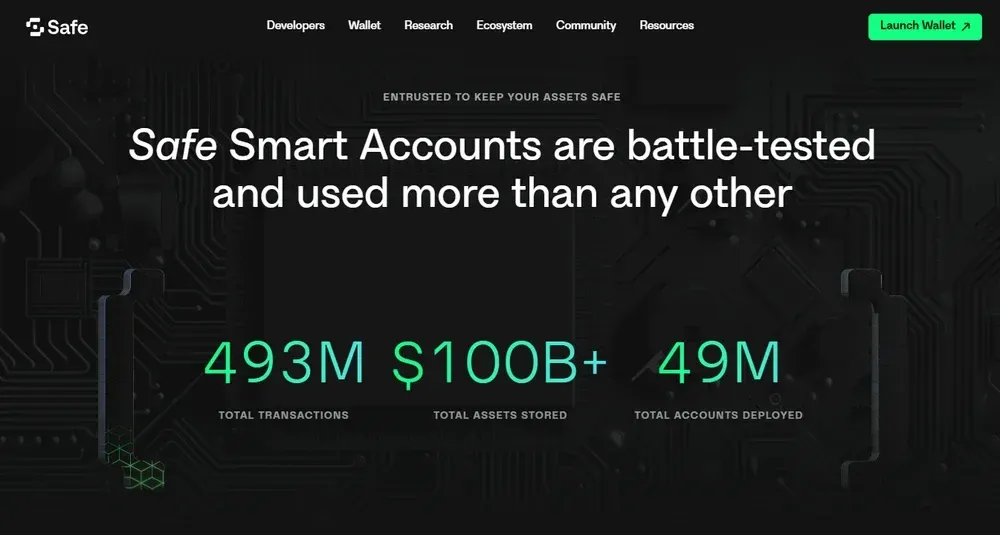
How to Secure Your Ethereum Wallet
Protecting your Ethereum wallet is essential to keep your crypto assets safe from theft or unauthorized access. Good security practices minimize risks and ensure your wallet remains under your control.
Follow these simple security tips:
- Choose Strong Passwords: Create unique, complex passwords for your wallet that combine letters, numbers, and special characters to prevent brute-force attacks.
- Secure Your Recovery Phrase: Write down your recovery phrase clearly, and store it safely offline, such as in a fireproof safe or lockbox.
- Set Privacy Preferences: Limit wallet permissions and disable unnecessary sharing features to avoid exposing your balance or transaction history publicly.
- Connect to Trusted Sites Only: Use official websites or verified links when connecting your wallet to dApps to prevent phishing attacks and scams.
- Enable Auto-Lock Feature: Set your wallet to automatically lock after short periods of inactivity to avoid unauthorized access if left unattended.
- Regularly Update Wallet Software: Keep your wallet app up-to-date to benefit from the latest security patches, bug fixes, and enhancements.
- Run Your Own Ethereum Node (Advanced): Operate your own node for improved transaction privacy and reduced reliance on third-party services, enhancing overall wallet security.
Final Thoughts
Ethereum wallets serve as the interface between users and the network. They handle transaction signing, contract interaction, and identity across apps and services.
MetaMask, Coinbase Wallet, and MyEtherWallet are great for browser and mobile access with varying levels of control, while Ledger Nano S Plus and Trezor Model T provide offline security for long-term storage and privacy.
Frequently asked questions
What happens if my Ethereum wallet provider shuts down?
Since Ethereum wallets like MetaMask or Trust Wallet store keys locally, you retain access by restoring your wallet elsewhere using your recovery phrase.
Can I recover ERC-20 tokens sent to the wrong Ethereum address?
Generally, transactions on Ethereum are irreversible; tokens sent to incorrect but valid addresses typically can't be recovered, so always double-check addresses.
What's the difference between using Ethereum wallets and centralized exchanges for staking?
Ethereum wallets like Exodus or Base App offer direct staking, giving full control, while exchanges handle your staking keys, reducing decentralization.
Can an Ethereum wallet help reduce gas fees for transactions?
Wallets don't lower Ethereum gas fees themselves, but using Layer-2 compatible wallets like MetaMask with Arbitrum can considerably reduce costs.
Why would I choose a multisig wallet like Safe for Ethereum?
Multisig wallets require multiple approvals to execute transactions, providing greater security for DAO treasuries, team-managed funds, or high-value Ethereum holdings.
%25201%2520(1).webp)
Written by
Emily Shin
Research Analyst
Emily is passionate about Web 3 and has dedicated her writing to exploring decentralized finance, NFTs, GameFi, and the broader crypto culture. She excels at breaking down the complexities of these cutting-edge technologies, providing readers with clear and insightful explanations of their transformative power.

.webp)
%2520(1).webp)

.webp)
.webp)




